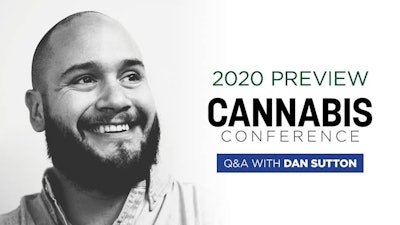
Dan Sutton, CEO and founder of British Columbia-based Tantalus Labs, has been building the company since its inception in 2012, and has monitored its performance through basic, core business principles like top-line revenue, EBITDA and market share. Although the company has not raised capital in recent years, when Sutton did seek financing, he kept his eye on the long-term success of the company and found investors who closely aligned with the business’s overall goals.
Here, Sutton shares more about his approach to monitoring and improving his company’s performance and capital flows, and offers advice for others looking for success in these areas.
Cannabis Business Times: How is company performance generally measured in the cannabis industry, and how have you measured it at Tantalus Labs?
Dan Sutton: There [are] some pretty straightforward core fundamentals, and that’s how you’ll be looking at the health of any business. Things like revenues will probably [determine] the size of your business, [but] I think, especially in cannabis, we look to [company] valuations and publicly traded prices and judge our size based on that. Truly, it’s how broad your reach is [and your] top-line revenue.
When you look a little bit deeper, we really like EBITDA—that’s earnings before interest, taxes, depreciation and amortization. That really shows how much money you’re taking home at the end of the day. That’s my favorite representative of the health of a company, is EBITDA. Then, what we’ve been getting to recently in Canada [is] market share. We can see how much cannabis we’re selling relative to the field in any given provincial market. Successful brands want to be competing on reputation [and] reach, and market share is probably the best representation of that.
I think at a really basic level, things like top-line revenue, EBITDA and market share would probably be really great places to start.
CBT: How can businesses work to improve company performance if they determine that any of these areas are lacking?
DS: Those areas are all very much lagging indicators—they’re backwards-looking mechanisms where you can say, “Last quarter or last year, this is how we did.” In order to get to that success and get to those measures of health, I think you have to start way earlier and look at, first and foremost, what’s your core offering? What business do you run, and what is it that you deliver in terms of value?
In the case of Tantalus Labs, we breed and cultivate our own flower cannabis and pre-rolls, and then we deliver those things to market. We’ve got a bunch of new segments coming, but that’s pretty new in Canada, so we take it back to things like greenhouse health, productivity per employee—various mechanisms that go into what we call an “enterprise scorecard.” Basically, every element of our business is being judged on these smaller metrics and given goals and targets to aspire to. If one is really lagging, we know we have to put more time and energy into developing that aspect of our business.
I think you have to break it down into who you are, and then what are the core things that make you good at being that company? And how do you facilitate growth in those areas?
CBT: How should companies monitor their capital flows?
DS: I think now is the time in cannabis history in the legal market where financiers are saying, “Show me, don’t tell me.” When we go out to raise capital, which we haven’t done in recent years, we really want to say, “This is the opportunity that you’re investing in now.” In the case of Tantalus Labs, it’s a cash-line business with longstanding revenue. In the case of an earlier enterprise, they might say, “We’ve got an advantage in technology” or “We’ve got an advantage in production capacity,” or whatever differentiates you, and then you want to find investors that most closely align with that business profile.
There are lots of investors in early cannabis start-ups that want to see really substantial growth, and there are different kinds of investors that want to invest in state enterprises and have a bit more of a stable and low-risk investment. We try to make sure that we always have capital for any new initiatives that we are taking on. That means oftentimes saying no to stuff that’s sort of nice to have but we’re not quite ready for it yet. That’s summed up in the concept of financial prudence. You take it one step at a time, ensuring that you have significant resources so you’re not going to run aground even if one of more of your core projects fail.
CBT: What are some common pitfalls that cannabis businesses face when it comes to managing capital, and how can these be avoided?
DS: The thing that I see most prolifically is really short-term decision making. I think in an environment where the cannabis capital markets were really excitable and there was this perception that it was going to keep growing and growing forever, people were quick to assure themselves, “OK, we’re going to do this potentially toxic financing round or a financing round that has some short-term mechanisms that favor the financiers, and it’s OK because we’ll just get through it and we’ll re-finance it later, or we’ll find a way to get resources in later.”
With capital raising, as much as [with] team selection [and] how you’re finding your co-founders, you really have to align the incentives of your investors with what it is you’re doing. In Tantalus Labs, we recognized that this cannabis opportunity is going to take several years to realize its true potential, so patient investors, people who are longstanding supporters of us, they’ve really been a critical asset to our story from the beginning. I think the answer is to really be careful with who you’re potentially getting married to in a business sense. Put one foot in front of the other and take it slowly so that your time horizons don’t become too short.
CBT: What do you hope attendees will bring back to their business from your session at Cannabis Conference 2020?
DS: I hope that I can be a voice that reminds everyone that business fundamentals are the core of this game. Love for cannabis, love for the marketplace, love for your customer—all of these things serve your ability to create a consistently profitable enterprise and consistently profitable outcomes for your shareholders, and this isn’t a marketplace where we need to shoot the moon. You can just slowly but surely add value to your offerings and hopefully exceed the expectations of your end user. At the end of the day, we have to make successful businesses if we want to see these dreams persist.
[Come] back to, how many people do you really need on your team? How much marketing spend do you really need in your first year? These kinds of questions have historically been answered by cannabis companies with huge investments and a massive vision that’s played out on a short-term time horizon. I think a return to fundamentals [and] a return to basic business principles [are needed.] We want to satisfy customers time and again, and that means oftentimes taking it slowly and being prudent.
Editor’s Note: This interview has been edited for style, length and clarity.























